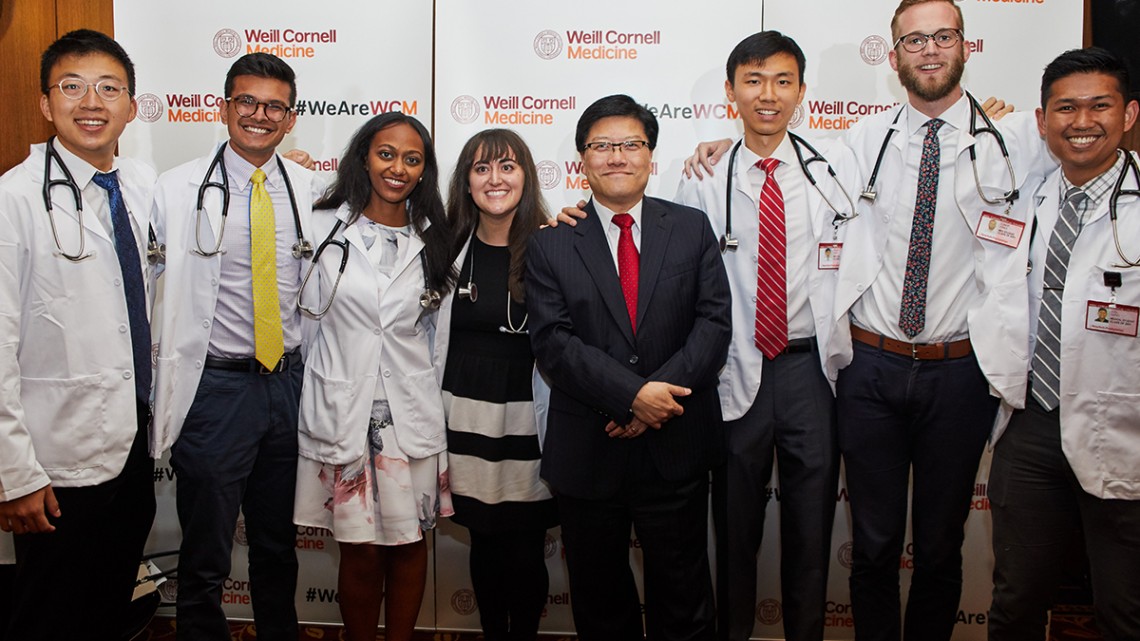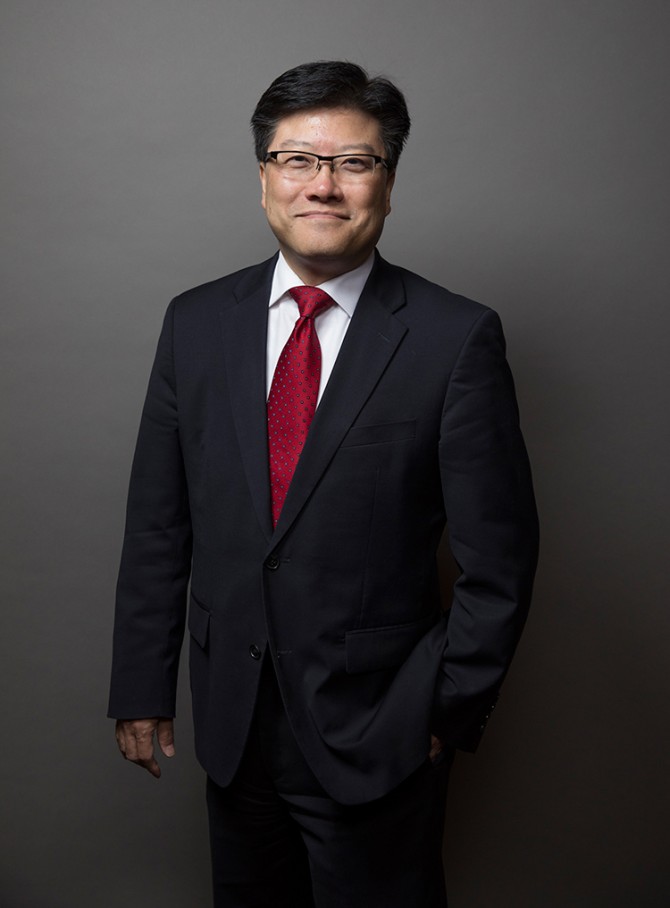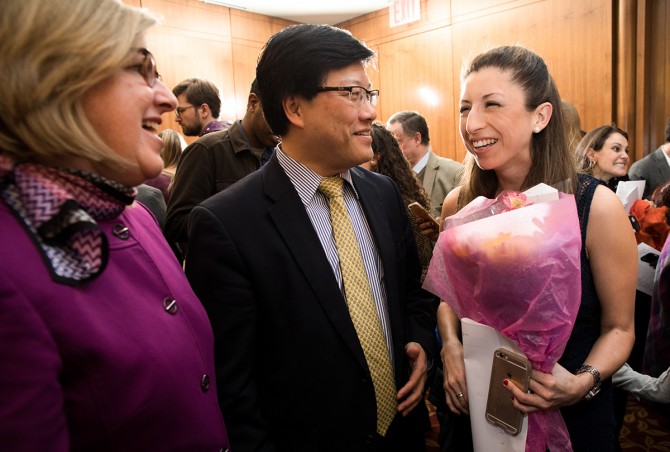
Dr. Augustine M.K. Choi, center, poses with first-year Weill Cornell Medicine students during their White Coat Ceremony Aug. 15, 2017.
Dr. Augustine M.K. Choi on collaboration, clinical care and consensus building
Dr. Augustine M.K. Choi has served as the Stephen and Suzanne Weiss Dean of Weill Cornell Medicine and Cornell University’s provost for medical affairs since January 2017.
You came here from Harvard in 2013 to lead the Weill Department of Medicine. What drew you to WCM?
I was directing the pulmonary and critical care division at Brigham and Women’s Hospital [in Boston]. The Weill Department of Medicine at Weill Cornell Medicine and NewYork-Presbyterian/Weill Cornell Medical Center encompasses 16 divisions – hematology and medical oncology, gastroenterology, cardiology, and more – so the opportunity to have a greater impact on a more diverse group of faculty was a big draw. In this era of declining National Institutes of Health funds and reduced reimbursements for patient care, many medical schools and departments of medicine are not growing; at Weill Cornell it has been quite the contrary. We have a tremendous amount of energy and growth in our community.
What in your personal and professional background contributes to your leadership style?
I think my parents had a lot to do with this. They were role models and supported me throughout my studies and into my career. Since my dad was a physician and scientist himself, he and I could especially relate. And as you develop throughout your career, you learn from your teachers, your mentors, and you create your own kind of philosophy of leadership.
I’ve always considered several tenets to be essential. One is consensus-building among your faculty, your students and your trainees. I think that’s important because on 15 out of 100 things, people don’t agree. So when you try to resolve those issues you need consensus-building. Two is transparency. Number three is caring. To be an effective leader, you care, you’re open and transparent, and you’re willing to work together to build consensus on issues where perhaps there’s not agreement.
You’ve said the educational system was a factor in drawing your parents to the United States after the Korean War. Do you think its promise still holds true today?
Absolutely – if you look at the 30-odd years I’ve been here, there are many areas in which the United States has fallen behind, whether it’s economics or the steel industry, but there’s one area where we still are second to none, which is higher education. The U.S. university system is the best in the world. The rigor and the quality are very consistent, and these are values we cannot lose. This is why I’m very passionate about the evolving policy on immigration, because part of the success of our university system has been our country’s very open policy for students from all over the world to come here for higher learning.
Supporting immigration to the U.S. is a win-win – we’re contributing to the well-being of the global community plus adding to our strengths here. We are the most diverse country in the world, and that’s one of our major strengths.
How does diversity benefit patient care, discoveries and education of future doctors?
Diversity positively impacts all of these areas. It promotes new and exciting ideas in the classroom and in the lab that are born of a wide range of experiences and histories, and these varied perspectives lead to new ways of delivering health care that benefits everyone.
At WCM, our enthusiasm for diversity enables us to attract the best minds in science and the most promising future doctors from all over the world. Having a range of perspectives in the lab and in the classroom challenges us to think innovatively, to collaborate, and raises the bar for what we can achieve together.
At the clinical end, diversity enhances the care we provide because it recognizes two key things: Gender and ethnicity affect not only the risk of disease, but the response to therapies and many other ways patients experience health and illness. Quite simply, it makes us more effective and compassionate physicians.
Tell us what role the faculty plays in mentoring trainees as well as junior faculty.
To truly fulfill their greatest potential, to navigate the next critical years as they pursue faculty status, they need mentors. We all need these relationships as we grow, and as we progress in our careers, it becomes our lifelong responsibility to nurture them and become mentors in our turn. In addition to mentoring being the right thing to do, it makes us more competitive as an institution.
How can alumni mentor Weill Cornell students and recent graduates?
Our alumni contribute quite a bit to our scholarship programs. But I would like to involve them more as we work to make mentoring more of an institutional priority, one that is just as important as our three missions of patient care, research and education. Our alumni association has a program in the works that will make it easier to become a mentor to recent medical school graduates.
How is WCM collaborating with Cornell Tech as well as with the Ithaca campus?
Precision medicine is one of the most innovative ways clinical care is changing, and to provide it effectively you need big data, patient genomic data. Acquiring that is easy now with the technology that we have at WCM, but the difficulty is analyzing that genomic information. This is where we can collaborate with the Ithaca campus and Cornell Tech, which are very strong in computing and machine learning. We are already collaborating with the Samuel Curtis Johnson Graduate School of Management on an executive MBA/M.S. in health care leadership; the Johnson School is strong in fostering the development of entrepreneurship in the life sciences, and we have a large portfolio of life sciences and health care research they can, in turn, benefit from.
What is the NIH’s role in promoting the advancement of research in the current period of uncertainty?
For the first time, we’ve had a very sustained period over more than a decade in which the NIH is setting increasingly competitive cutoff points in deciding which grants to fund. We are at risk of losing a generation of innovative, creative scientific minds because of these funding uncertainties.
The good news is that it looks like the budget for next year will not be reduced, but we need to continue our advocacy activities and inform our congressional leaders that NIH funding must at least be maintained or even increased. We also need to be prepared for unexpected changes in the funding climate, so we have to find other resources, whether they’re in the private sector, foundations or philanthropy. We are very proactive about pursuing alliances with pharma and building a culture of entrepreneurship to help support our research mission. We cannot rely solely on the federal government.
Why is Weill Cornell Medicine-Qatar important?
We’re committed to providing the best quality of health care to our patients in New York and throughout the region and the nation, but we’d also like to have an impact on public health and research globally. It’s a critically important part of our mission.
After 16 years, we’re very proud of the impact that we’ve had: We have uplifted the quality of health care in that area of the Middle East and trained more than 300 doctors. Many of those doctors completed residencies at top hospitals in the U.S., and now they’re going back to their homelands in the [Persian] Gulf. Some became faculty members at Weill Cornell Medicine-Qatar.
Private and government entities in China and elsewhere are now coming to us to help establish international hospitals for patient care, research and medical education because we’ve built a reputation for creating global programs that excel and for having meaningful international collaborations.
How is WCM promoting health in Haiti and Tanzania?
Our programs in Haiti and Tanzania are two of our biggest and most long-standing global health initiatives. Faculty members Dr. Jean Pape in Haiti, and Dr. Robert Peck and Dr. Jennifer Downs in Tanzania live in those countries to build sustained relationships, and many WCM students spend time there. When I talk to our chairman emeritus, Sandy Weill, we always agree on the importance of our role in improving health care overseas. In Tanzania, Sandy committed resources to support the Weill Bugando University College of Health Sciences. A key part of the mission there is to train local physicians who provide health care and do research. In Haiti, we have a close affiliation with the GHESKIO clinic, which has led research on HIV/AIDS in the Caribbean since the start of the epidemic and has been critical for Haitians during natural disasters. We’re very proud of those two major initiatives.
What role does Weill Cornell Medicine ultimately need to play in today’s society?
At the end of the day, for the good of humanity, we all have to play a part in maintaining dignity and respect in our society. And our role is certainly focused on education, training, and making discoveries and positive impacts on clinical care. We are in the unique and honorable position of contributing to individual lives in lasting ways that can lead to positive ripple effects for the wider community. It’s exciting and humbling to be part of Weill Cornell Medicine and an institution that can have such far-reaching impact.
Media Contact
Get Cornell news delivered right to your inbox.
Subscribe

